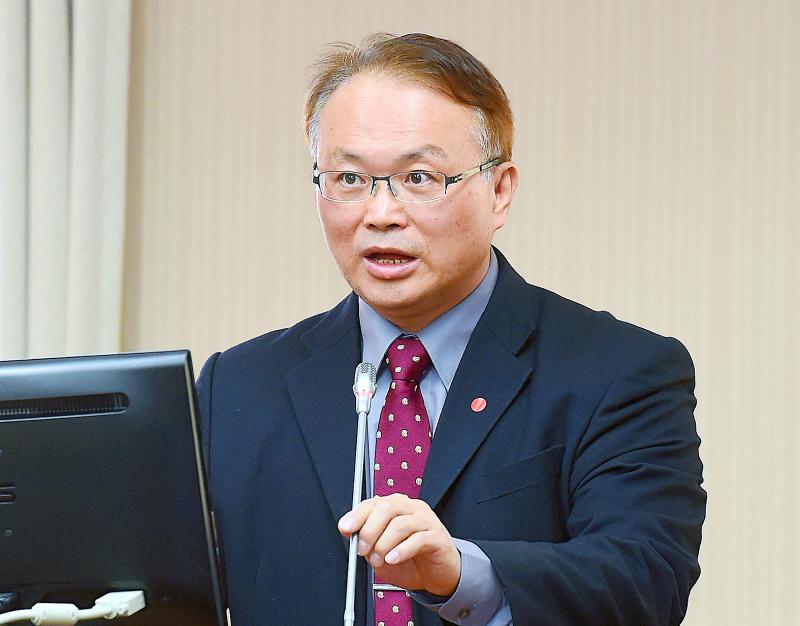Chinese over-the-top (OTT) service provider iQiyi cannot register as a provider in Taiwan after the Mainland Affairs Council declared it to be an illegal service, the National Communications Commission (NCC) said yesterday.
Both iQiyi and WeTV were deemed to be illegal Chinese OTT operators in an interdepartmental meeting on Friday last week, officials said, adding that this prohibits them from marketing their services in Taiwan or seeking subscribers.
The government plans to block a local server that iQiyi has been using to transmit content to domestic audiences, which would disrupt its content transmission.

Photo: Chu Pei-hsiung, Taipei Times
OTT Entertainment Ltd, which is enlisted by iQiyi to handle subscription-related affairs in Taiwan, on Monday said that its local service platform does not disseminate political content, adding that it has invested more than NT$1 billion (US$33.38 million) in content production.
NCC spokesman Hsiao Chi-hung (蕭祈宏) said that the council decided that iQiyi breached the Act Governing Relations Between the People of the Taiwan Area and the Mainland Area (台灣地區與大陸地區人民關係條例) by offering an OTT TV service, which the act does not permit Chinese to invest in.
Taiwanese OTT operators are not allowed to launch such services in China, he added.
A commission draft act on OTT TV services would require all legal OTT operators to register with the commission, although iQiyi is no longer a legal operator, he said.
Commission officials said that iQiyi’s Taipei office was set up under a company legally registered with the Ministry of Economic Affairs, Qiyi.com Hong Kong Ltd.
The company streams content over a server that it leases from a Cambridge, Massachusetts-based global content delivery network, Akamai Technologies, whose clients include YouTube and Netflix, they said, adding that tackling the issue would be difficult from a technical perspective.
To resolve the controversies surrounding iQiyi, Hsiao said that the council would need to amend the Act Governing Relations Between the People of the Taiwan Area and the Mainland Area so that investments from Hong Kong and China are equated if related, something used to revoke iQiyi’s business registration in the nation.
Also, the ministry would need to amend regulations so that Taiwanese companies would be banned from offering prohibited services in Taiwan, as such a change is needed so that Akamai could drop iQiyi as a client, Hsiao added.

POSITIVE DEVELOPMENT: Japan and the US are expected to hold in-depth discussions on Taiwan-related issues during the meeting next month, Japanese sources said The holding of a Japan-US leaders’ meeting ahead of US President Donald Trump’s visit to China is positive news for Taiwan, former Japan-Taiwan Exchange Association representative Hiroyasu Izumi said yesterday. After the Liberal Democratic Party’s landslide victory in Japan’s House of Representatives election, Japanese Prime Minister Sanae Takaichi is scheduled to visit the US next month, where she is to meet with Trump ahead of the US president’s planned visit to China from March 31 to April 2 for a meeting with Chinese President Xi Jinping (習近平). Japan and the US are expected to hold in-depth discussions on Taiwan-related issues during the

‘LIKE-MINDED PARTNER’: Tako van Popta said it would be inappropriate to delay signing the deal with Taiwan because of China, adding he would promote the issue Canadian senators have stressed Taiwan’s importance for international trade and expressed enthusiasm for ensuring the Taiwan-Canada trade cooperation framework agreement is implemented this year. Representative to Canada Harry Tseng (曾厚仁) in an interview with the Central News Agency (CNA) said he was increasingly uneasy about Ottawa’s delays in signing the agreement, especially as Ottawa has warmed toward Beijing. There are “no negotiations left. Not only [is it] initialed, we have three versions of the text ready: English, French and Mandarin,” Tseng said. “That tells you how close we are to the final signature.” Tseng said that he hoped Canadian Prime Minister Mark Carney

President William Lai (賴清德) yesterday bestowed one of Taiwan’s highest honors on Saint Vincent and the Grenadines (SVG) Ambassador Andrea Clare Bowman in recognition of her contributions to bilateral ties. “By conferring the Order of Brilliant Star with Grand Cordon on Ambassador Bowman today, I want to sincerely thank her, on behalf of the Taiwanese people, for her outstanding contribution to deepening diplomatic ties between Taiwan and SVG,” Lai said at a ceremony held at the Presidential Office in Taipei. He noted that Bowman became SVG’s first ambassador to Taiwan in 2019 and

A man walks past elementary school artworks at the Taipei Lantern Festival in Ximen District yesterday, the first day of the event. The festival is to run from 5pm to 10pm through March 15.